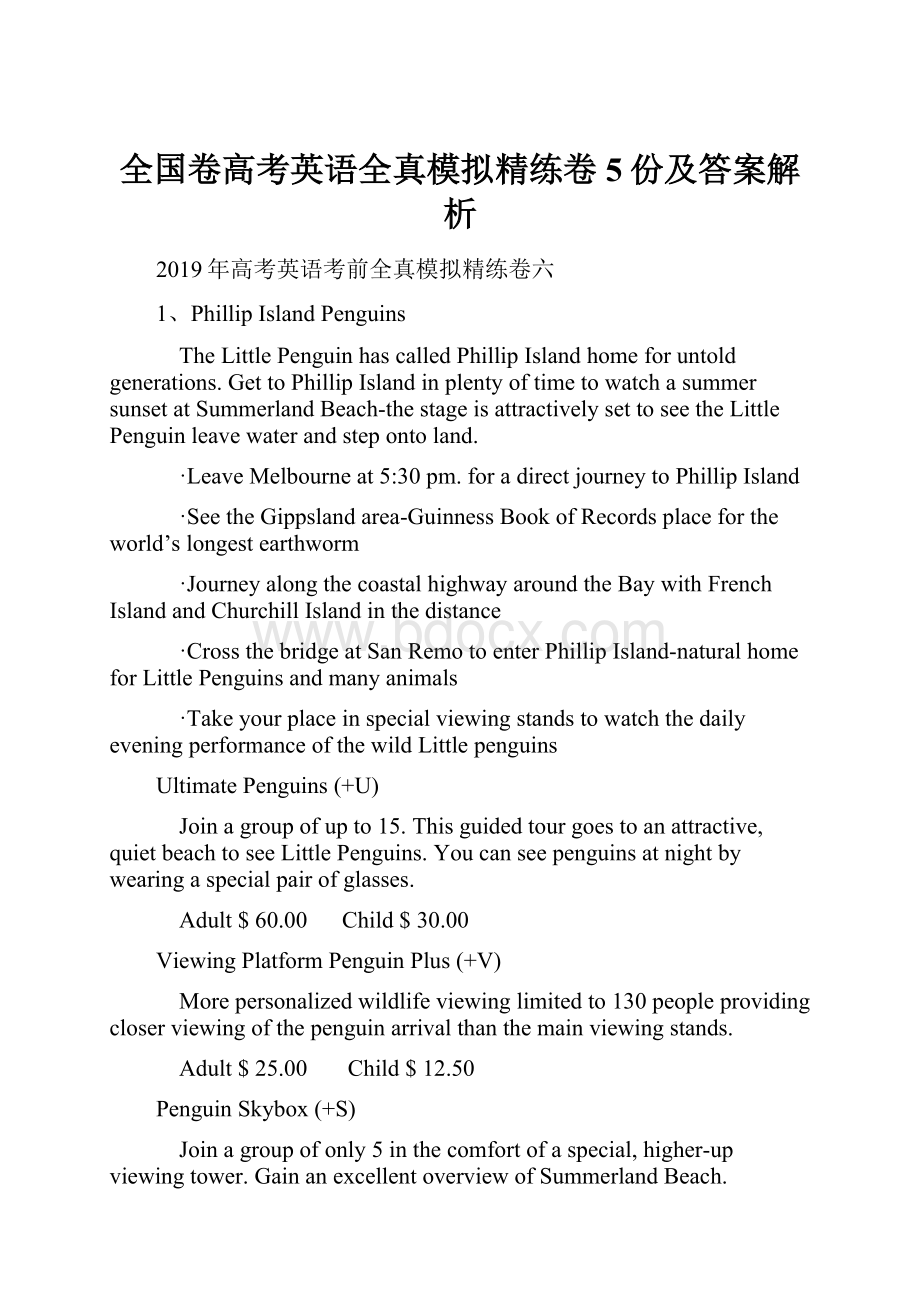全国卷高考英语全真模拟精练卷5份及答案解析Word文档格式.docx
《全国卷高考英语全真模拟精练卷5份及答案解析Word文档格式.docx》由会员分享,可在线阅读,更多相关《全国卷高考英语全真模拟精练卷5份及答案解析Word文档格式.docx(85页珍藏版)》请在冰豆网上搜索。

JourneyalongthecoastalhighwayaroundtheBaywithFrenchIslandandChurchillIslandinthedistance
CrossthebridgeatSanRemotoenterPhillipIsland-naturalhomeforLittlePenguinsandmanyanimals
TakeyourplaceinspecialviewingstandstowatchthedailyeveningperformanceofthewildLittlepenguins
UltimatePenguins(+U)
Joinagroupofupto15.Thisguidedtourgoestoanattractive,quietbeachtoseeLittlePenguins.Youcanseepenguinsatnightbywearingaspecialpairofglasses.
Adult$60.00
Child$30.00
ViewingPlatformPenguinPlus(+V)
Morepersonalizedwildlifeviewinglimitedto130peopleprovidingcloserviewingofthepenguinarrivalthanthemainviewingstands.
Adult$25.00
Child$12.50
PenguinSkybox(+S)
Joinagroupofonly5inthecomfortofaspecial,higher-upviewingtower.GainanexcellentoverviewofSummerlandBeach.
Adult16yrs+$50.00
1.Whatkindofpeopleisthetextmainlywrittenfor?
A.Scientists.
B.Students.
C.Tourists.
D.Artists.
2.WhatcanwelearnfromthetextaboutLittlePenguins?
A.TheyhavebeenonPhillipIslandforyears.
B.TheykeepaGuinnessrecordfortheirsize.
C.Theyaretrainedtopracticedivingforvisitors.
D.Theyliveinlargegroupstoprotectthemselves.
3.Howmuchwouldacouplewithonechildpayforacloserviewingtour?
A.$37.50.
B.$62.50.
C.$150.00.
D.$180.00.
2、AsmoreandmorepeoplespeakthegloballanguagesofEnglish,Chinese,Spanish,andArabic,otherlanguagesarerapidlydisappearing.Infact,halfofthe6,000-7,000languagesspokenaroundtheworldtodaywilllikelydieoutbythenextcentury,accordingtotheUnitedNationsEducational,Scientific,andCulturalOrganization(UNESCO).
Inanefforttopreventlanguageloss,scholarsfromanumberoforganizations--UNESCOandNationalGeographicamongthem–haveformanyyearsbeendocumentingdyinglanguagesandtheculturestheyreflect.
MarkTurin,ascientistattheMacmillanCenter,YaleUniversity,whospecializesinthelanguagesandoraltraditionsoftheHimalayas,isfollowing
inthattradition.Hisrecentlypublishedbook,AGrammarofThangmiwithanEthnolinguisticIntroductiontotheSpeakersandTheirCulture,growsoutofhisexperienceliving,workingandraisingafamilyinavillageinNepal.
DocumentingtheTangmilanguageandcultureisjustastartingpointforTurin,whoseekstoincludeotherlanguagesandoraltraditionsacrosstheHimalayansreachesofIndia,Nepal,Bhutan,andChina.Butheisnotcontenttosimplyrecordthesevoicesbeforetheydisappearwithoutrecord.
AttheUniversityofCambridgeTurindiscoveredawealthofimportantmaterials--includingphotographs,films,taprecordings,andfieldnotes----whichhadremainedunstudiedandwerebadlyinneedofcareandprotection.
Now,throughthetwoorganizationsthathehasfounded---theDigitalHimalayaProjectandtheWorldOralLiteratureProject---Turinhasstartedacampaigntomakesuchdocuments,foundinlibrariesandstoresaroundtheworld,availablenotjusttoscholarsbuttotheyoungergenerationsofcommunitiesfromwhomthematerialswereoriginallycollected.ThankstodigitaltechnologyandthewidelyavailableInternet.Turinnotes,theendangeredlanguagescanbesavedandreconnectedwithspeechcommunities.
1.Manyscholarsaremakingeffortsto
.
A.rescuethedisappearinglanguages
B.promotegloballanguages
C.searchforlanguagecommunities
D.setuplanguageresearchorganizations.
2.Whatdoes“thattradition”inParagraph3referto?
A.Havingfullrecordsofthelanguages.
B.Writingbooksonlanguageteaching.
C.Tellingstoriesaboutlanguageusers.
D.Livingwiththenativespeakers.
3.WhatisTurin’sbookbasedon?
A.TheculturalstudiesinIndia.
B.ThedocumentsavailableatYale.
C.HislanguageresearchinBhutan.
D.HispersonalexperienceinNepal.
4.WhichofthefollowingbestdescribesTurin’swork?
A.Write,sellanddonate.
B.Record,repairandreward.
C.Collect,protectandreconnect.
D.Design,experimentandreport.
3、YouthfootballteammembersrescuedmorethantwoweeksaftersuddenfloodingtrappedtheminacaveinThailandarenowbeingwelllookedafteratahospitalinthenortherncityofChiangRai.Inadditiontotreatingtheboysforpotentialbodyfluidloss,inadequatenutritionandlackofoxygen,theirdoctorsalsoplantocloselymonitorthemforsymptomsofdiseasesthatmayhavebeeninfectedbyanimalslivinginthecave.
“Thenextstepistomakesurethosekidsandtheirfamiliesaresafe,becauselivinginacaveprovidesadifferentenvironment,whichmightcontainanimalsthatcouldtransmit…disease,”saidthelocalhospital.Theboysandtheirfamilymembershavebeentoldtowatchforsymptomssuchasheadache,nausea(反胃),musclepainordifficultybreathing,thereportsadded.
Yetbasedonthelocationwheretheboysweretrapped—morethanfourkilometersfromthecavecomplex’smainentrance,pastsomefullysubmergedpassages—andthefacttheyhavebeenswimmingoutwearingfullscubafacemasks,itseemsunlikelythattheywerelivingwithbatsinthecaveorbreathedinbat-associatedbacteriaduringtheirrescue,severalinfectiousdiseaseexpertssaid.“It’shardtoimaginebatsgotthatdeepintothecavebecauseofallthosenarrowpassageways,butitispossible,”saysIanLipkin,ananimalexpertandprofessorattheMailmanSchoolofPublicHealthatColumbiaUniversity.“It’sunlikelythattherewouldbemanyanimalsinthere,”notesJonathanEpstein,adoctoratEcoHealthAlliance,anonprofitorganizationthatstudiesdiseasesandhowtopreventthem.
Batstypicallyliketorestinareastheycaneasilyenterandexit,notinplacesthatfullyflood,headds.BatsinThailandhavebeenlinkedwithawiderangeofvirusesthataresimilartosevereacuterespiratorysyndrome(SARS)—Lipkinsays.Butitseemsmorelikelytheboyswouldhavebeenexposedtoinfection-causingbacteriawhentheyswamthroughthedirtywaterwithcutsandscrapes.“Ifyouaretryingtoprioritizeissueswithrespecttohealthcareforthesekids,numberonewouldbepsychologicaldamageandsecondwillbebacterialinfectionsfromthecutsandscrapestheymayhaveencountered.”Lipkinsays.
1.Accordingtothepassage,whichofthefollowingisNOTthepotentialsymptomoftherescuedteammembers?
A.Lackingbodywater
B.Unbalancednutrition
C.Painintheheadandmuscles
D.Adequateoxygen
2.Theunderlinedword“submerged”inparagraph3means____________.
A.underthewater
B.wildanddangerous
C.withanimals
D.bat-associated
3.Whichistrueaboutthecavesandthetrappedpeople?
A.JonathanEpsteinthoughtitpossiblefortheteammemberstobeattackedbybatsinthefully-floodedcave.
B.Lipkinarguedbatswerenotabletogetdeepintothenarrowcavewherethekidsweretrapped.
C.Lipkinsaidthevictimsmightbeinfectedwhentheirbodywereexposedtobacterialwaterduringtherescue.
D.Lipkinbelievedthemostimportantissueforthecave-trappedteenagerswasinfectiousbacteriaexamination.
4.Whatisthetexttypeofthepassage?
A.Anacademicessayaboutbats.
B.Anewspaperarticle.
C.Amedicalmagazine.
D.AThaiwebsiteaboutsports.
4、
Everwalkedtotheshopsonlytofind,oncethere,you’vecompletelyforgottenwhatyouwentfor?
Orstruggledtorememberthenameofanoldfriend?
Foryearswe’veacceptedthataforgetfulbrainisasmuchapartofagingaswrinklesandgrayhair.Butnowanewbooksuggeststhatwe’vegotitallwrong.
AccordingtoTheSecretLifeoftheGrown-upBrain,bysciencewriterBarbaraStrauch,whenitcomestotheimportantthings,ourbrainsactuallygetbetterwithage.Infact,shearguesthatsomestudieshavefoundthatourbrainhitsitspeakbetweenour40sand60s—muchlaterthanpreviouslythought.
Furthermore,ratherthanlosingmanybraincellsasweage,wekeepthem,andevenproducenewoneswellintomiddleage.Foryearsit’sbeenassumedthatbrain,muchlikethebody,declineswithage.Butthelongest,largeststudyintowhathappenstopeopleastheyagesuggestsotherwise.
Thiscontinuingresearchhasfollowed6,000peoplesince1956,testingthemeverysevenyears.Ithasfoundthatonaverage,participantsperformedbetteroncognitive(认知的)testsintheir40sand50sthantheyhaddoneintheir20s.Specifically,olderpeopledidbetterontestsofvocabulary,verbalmemory(howmanywordsyoucanremember)andproblemsolving.Wheretheyperformedlesswellwasnumberabilityandperceptualspeed—howfastyoucanpushabuttonwhenordered.However,withmorecomplextaskssuchasproblem-solvingandlanguage,weareatourbestatmiddleageandbeyond.Inshort,researchersarenowcomingupwithscientificproofthatwedogetwiserwithage.
Neuroscientistsarealsofindingthatwearehappierwithaging.ArecentUSstudyfoundolderpeopleweremuchbetteratcontrollingandbalancingtheiremotions.Itisthoughtthatwhenwe’reyoungerweneedtofocusmoreonthenegativeaspectsoflifeinordertolearnaboutthepossibledangersintheworld,butaswegetolderwe’velearnedourlessonsandareawarethatwehavelesstimeleftinlife:
therefore,itbecomesmoreimportantforustobehappy.